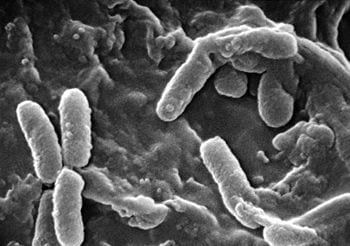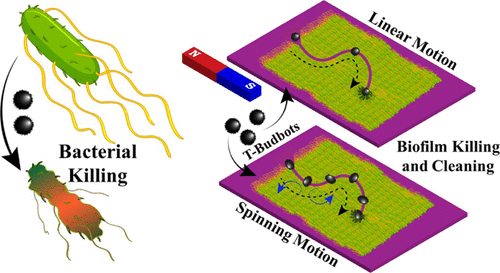
The team from the School of Pharmacy at Queen’s have developed the first innovative antibacterial gel that acts to kill Pseudomonas aeruginosa, staphylococci and E.coli using natural proteins.
The gels have the ability to break down the thick jelly-like coating, known as biofilms, which cover bacteria making them highly resistant to current therapies, while leaving healthy cells unaffected. Dr Garry Laverty, from the School of Pharmacy at Queen’s University, and lead researcher, said: “When bacteria attach to surfaces, including medical implants such as hip replacements and catheters, they produce a jelly-like substance called the biofilm. This protective layer is almost impossible for current antibiotics to penetrate through. Therefore bacteria deep within this protective layer are resistant as they remain unexposed to the therapy. They grow and thrive on surfaces to cause infections that are very difficult to treat.
The only option is often to remove the medical implant leading to further pain and discomfort for the patient. Our gels would prevent this. “Our gels are unique as they target and kill the most resistant forms of hospital superbugs.
The Latest on: Superbug antibacterial gel
[google_news title=”” keyword=”Superbug antibacterial gel” num_posts=”10″ blurb_length=”0″ show_thumb=”left”]
via Google News
The Latest on: Superbug antibacterial gel
- Light-activated propulsion spins bacteria-shredding micromotorson April 17, 2024 at 5:00 pm
According to the CDC, the superbugs were responsible for nearly ... Silver has long been understood to have antibacterial properties with silver salts used to heal wounds over 3,000 years ago ...
- Research Roundup: Superbug-fighting drugs, affordable green energy and anti-agingon April 7, 2024 at 10:36 pm
generates chemical “recipes” and instructions to construct drugs capable of killing bacteria that have grown to withstand the effects of traditional antibiotics (commonly called “superbugs”).
- Wound Treatment Gel Fights the Battle Against Antibacterial Resistanceon April 2, 2024 at 4:59 pm
Subscribe for FREE Using the common hydrogel Gel-MA, they added the amino acid polylysine and platelet-rich blood plasma to create properties that are well-suited to wound care. The result is a ...
- How to pack the perfect picnicon December 20, 2023 at 6:32 am
Finally, carry some hand wipes or anti-bacterial gel and ensure everyone's hands are clean before eating. Find out more about how to transport food safely. Avoid soggy salads and sandwiches by ...
- Experts warn of superbug risks after Madonna’s hospitalisationon July 11, 2023 at 5:00 pm
Superbugs and sepsis Three quarters of AMR or “superbug” infections are caused by just six bacterial strains, including Staphylococcus aureus (SA), the world’s most common cause of bacterial ...
- Meet the safest dental clinics in Tijuanaon October 12, 2020 at 5:00 pm
"Disinfectant mat when entering, shoe covers and protective cap for each patient, temperature taking, antibacterial gel, protective rinse, disinfection of the bathroom every hour". " Protection of ...
- Antibacterial Soapon August 17, 2020 at 10:31 pm
Some researchers even think using antibacterial soap may contribute to the rise of superbugs-- bacteria that can't be killed by antibiotics. Now that's dangerous. You can rest easy that a good old ...
- Arms Race With a Superbugon November 7, 2018 at 2:03 pm
As with penicillin, only a year passed after this semi-synthetic penicillin was released before methicillin-resistant Staph aureus (MRSA) was reported. Initially, MRSA only appeared in hospitals ...
- Study: Honey can kill superbugson July 1, 2009 at 5:00 am
LONDON, England (CNN)-- Honey has been used to treat wounds since ancient times, but recent years have seen a surge of medical interest in the sticky stuff. Manuka honey has been the subject of ...
via Bing News










